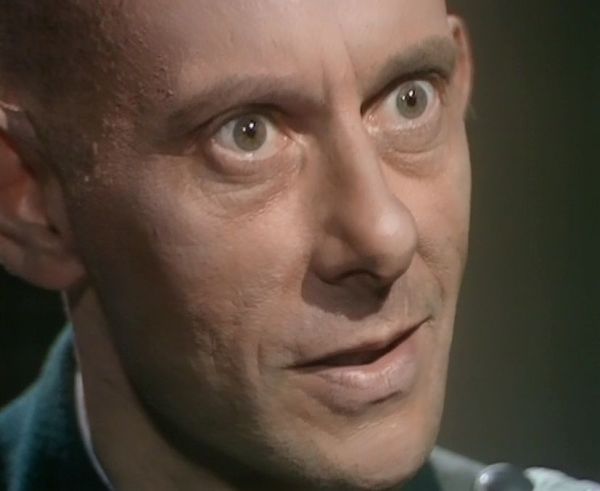Like the first episode, Missing, Presumed Dead introduces us to a single character – today it’s Flt. Lt. Simon Carter (David McCallum). But unlike Pat, we get to see something of Simon’s home life before he becomes a prisoner of the Germans.
Simon seems to enjoy giving everyone a hard time. If he’s not bawling out the ground crew then he’s crossing swords with his boss, Wing Commander Cannock (Peter Halliday). Simon might have a point – sloppy maintenance work could endanger the whole crew – but equally he may just be a perfectionist asking for the impossible.
Things are also sticky on the domestic front. Recently married to Cathy (Joanna David), he’s very icy with her (employing emotional blackmail with no compunction). About the only person he’s civil to is her father, Devenish (Noel Johnson). Devenish is clearly very well off (his well stocked wine cellar is testament to that).
Simon’s blunt working-class attitude should grate against Devenish’s upper-class sensibility, but they seem to have a relationship of perfect equanimity (although the pair only share a brief few moments of screentime). It’s a nice turn from Johnson though, managing to suggest that there’s a lot more to Devenish than his surface persona of a distracted wine snob.
Later that day Simon is shot down over Germany. His attempts to evade capture are reasonably interesting, but this section is mostly enlivened by the people he meets along the way, such as a friendly priest (played by Joe Dunlop) and a decidedly unfriendly Gestapo officer (Michael Wynne).
Eventually he winds up at a prisoner of war camp run by Kommandant Esslin (Oscar Quitak). It’s always entertaining, when watching a series produced by Gerard Glaister, to spot the actors who had either appeared in a previous production of his or would go on to work with him in the future. For example, Quitak later played Joseph Mengele in Kessler, the Secret Army spin-off, as well as Richard Shellet in Howards’ Way.
Today, Quitak is shaven-headed and like Michael Sheard in the previous episode has no trouble in playing an implacable German Kommandant.
Another good cameo performance comes from the always dependable John Ringham as Major Dalby. The Senior British Officer at Simon’s current camp, whilst he may initially appear to be a little Blimpish, he’s actually quite happy to assist Simon in escaping. The only problem is that Simon will have to wait his turn (no half-baked attempts which only lead to instant recapture will be tolerated).
When everybody ends up at Colditz this sort of rule is understood and (generally) obeyed. But Simon simply can’t stomach the fact that he may have to remain at the camp for a year or so until his name goes to the top of the list. So it won’t surprise you to learn what happens ….
Recaptured after an opportunistic escape attempt, there’s a sense of deja vu when Kommandant Esslin delights in telling Simon that he’s being sent to a very special camp – Colditz.


